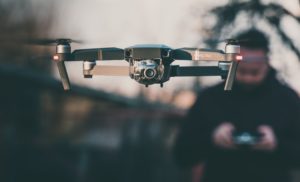 In the UK, anybody over the age of 18 can purchase a drone and, after a quick, online multiple-choice quiz, register and fly it. Legally, any adult can fly lightweight drones recreationally without a license. However, if you are more serious about flying and want to use drone piloting as a way of making money, you need to apply for a Permission for Commercial Operations (PfCO).
In the UK, anybody over the age of 18 can purchase a drone and, after a quick, online multiple-choice quiz, register and fly it. Legally, any adult can fly lightweight drones recreationally without a license. However, if you are more serious about flying and want to use drone piloting as a way of making money, you need to apply for a Permission for Commercial Operations (PfCO).
The following is a guest post by Dan Brown, Camera Operator and Editor at U.K. and South Africa-based TopLine Film.
What is a PfCO?
The PfCO, sometimes informally called a ‘drone license’, is a document issued by the Civil Aviation Authority (CAA) which gives you permission to fly a drone weighing up to 20kg commercially. The use of drones in various fields continues to increase, so investing in a PfCO is a valuable proposition.
How do I get one?
A PfCO is issued when you complete a training course with a school that has registered with the CAA, called a National Qualified Entity (NQE). There are NQEs which cater to a variety of skill levels from absolute beginner to experienced hobbyist, so be sure to do your research and choose the right course for you.
What is the training like?
Most CAA-approved courses begin with two days of ‘Ground School’. This involves learning about drone operation in a classroom setting and concludes with a theory exam – much like the theory component of earning a driving license. Ground School covers the legal requirements of operating a drone, the basic physics of flight and electronics, emergency procedures, flight planning and meteorology, among other things.
This stage often includes the writing of your Operations Manual. This is a document that you submit to the CAA outlining how you intend to use your drone commercially, and it’s a prerequisite to earning your PfCO. Make sure to get this right, because there’s a fee for resubmitting it.
What sort of practical assessment is there?
Once you’ve passed your theory exam, you’re on to the practical flight test. This gives you the chance to get hands on and prove that you can fly safely over the course of an hour and a half. You’ll need to demonstrate diligent pre-flight planning, responsible set-up, and – most importantly – competent flying. The student will be instructed to perform a series of manoeuvres without the assistance of ATTI mode and will be judged on their performance. Most schools advise that students have at least five hours of flight time logged before attempting their flight test.
What next?
Once you’ve completed Ground School, your practical assessment and your Operations Manual, it’s time to submit your application to the CAA. The NQE can’t do this step for you, but it’s straightforward: you simply fill in the paperwork and submit it online. You will also need to pay the application fee of £247, and be aware that a rejected application still costs £150 – so be sure to check and double check your paperwork. After that, you’ll hear back whether your application has been successful, and if it is, you’re ready to fly.
How long does the PfCO apply?
As any enthusiast can tell you, drone technology is advancing incredibly rapidly. As a result, the CAA is concerned that a course one year might lose relevance the next, so they require recertification annually. Your NQE should keep in touch with you and let you know about any changes in the law, but it’s also worth keeping an eye on the news and social media yourself. When it comes to recertification, you can either do it yourself or go through an external company for a more convenient, faster turnaround.
 Dan Brown is a licensed drone operator, camera operator and editor working full-time for video agency, Topline Film in Central London. Dan has a Masters Degree in Cinematography and a Bachelor Degree in Film.
Dan Brown is a licensed drone operator, camera operator and editor working full-time for video agency, Topline Film in Central London. Dan has a Masters Degree in Cinematography and a Bachelor Degree in Film.
Miriam McNabb is the Editor-in-Chief of DRONELIFE and CEO of JobForDrones, a professional drone services marketplace, and a fascinated observer of the emerging drone industry and the regulatory environment for drones. Miriam has penned over 3,000 articles focused on the commercial drone space and is an international speaker and recognized figure in the industry. Miriam has a degree from the University of Chicago and over 20 years of experience in high tech sales and marketing for new technologies.
For drone industry consulting or writing, Email Miriam.
TWITTER:@spaldingbarker
Subscribe to DroneLife here.







[…] Source link […]